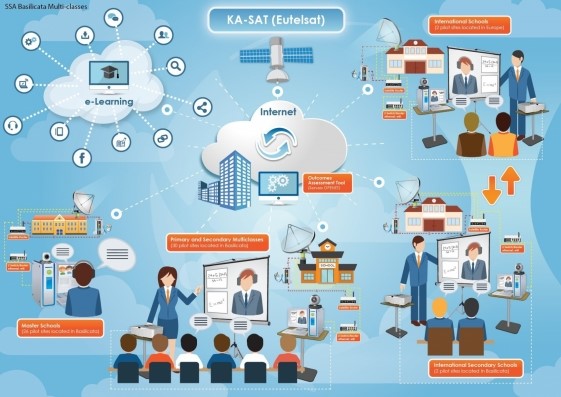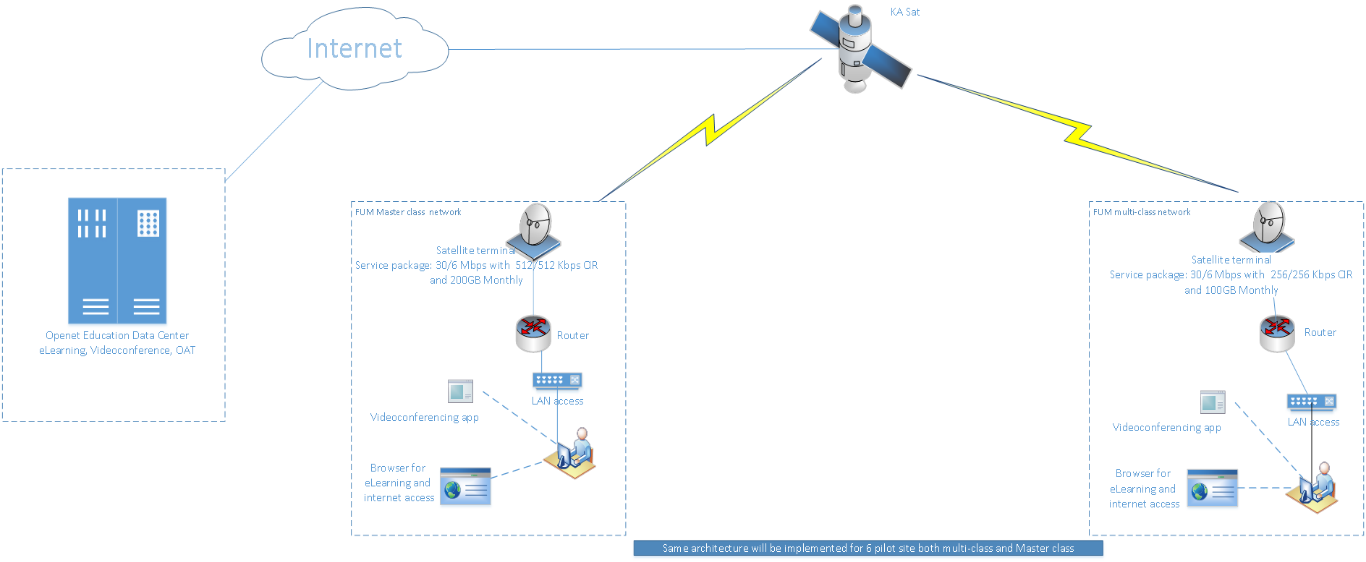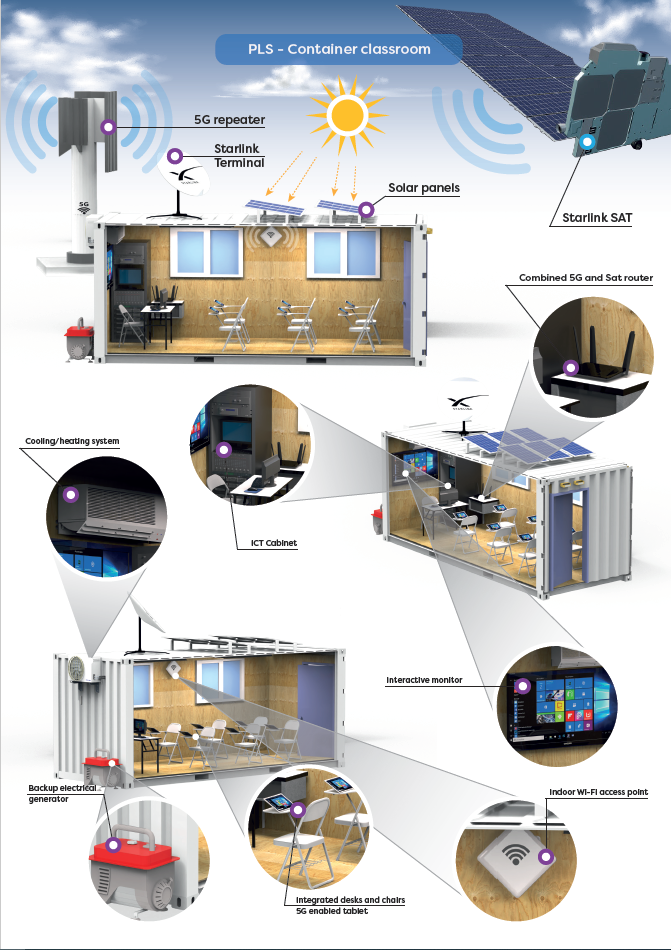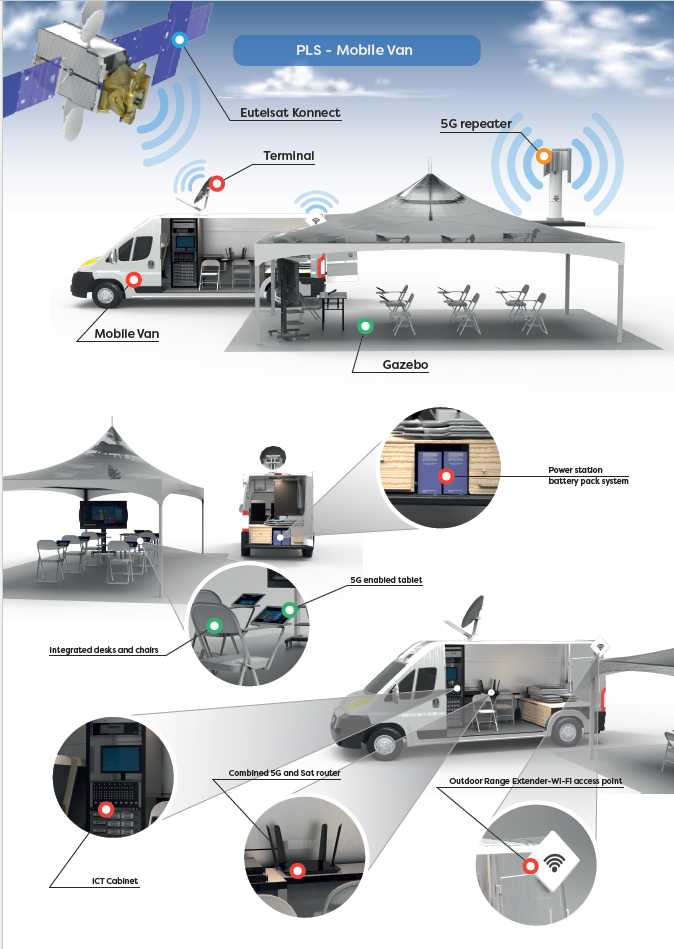
Objectives of the service
1. Basilicata Multi-classes
The ONE CLASS! project supports the Basilicata Region and the associated educational institutions needing to ensure to each student present in a multi-class the access to the complete educational programme as delivered in regular classes, where each level has a dedicated teaching team. At this aim, ONE CLASS! offers a satcom solution to:
-
Overcome digital isolation via the satellite technology
-
Overcome the limit of a multiclass via the provisioning of a new didactic model
-
Innovate the educational system towards an active dimension of learning.
The project wants to create “one class” virtually opened to several users and offering relevant opportunities to access to educational experiences, contents and relations wider than the ones offered by a usual physical class.
2. Social Integration Services for Foreign Unaccompanied Minors (FUM)
As for the multiclass, the ONE CLASS! project is conceived to propose an efficiently monitored SATCOM solution integrated with eLearning services to support social operator entities, reception centres of immigrants and other NGO’s active in the field which needed to offer to foreign unaccompanied minors (FUM) educational and social inclusion services, being often located in very remote areas.
Users and their needs
Multiclasses service for the Basilicata region:
-
Schools: Students and teachers are the “final users” of the ONE CLASS! solution. They need to overcome the limitations imposed by the multi-classes by accessing to a complete educational path.
-
The Basilicata Region: it needs to find a new didactic model fitting the needs of the many multi-classes spread on its territory.
-
Regional Education Office: it plays an important role in the process of involvement of the schools and in the design, monitoring and assessment of the education path.
-
Italian Ministry of Education (MI): it supports the process of both digitalisation of schools and innovation in the learning/teaching practices.
With regard to the Social Integration Services for FUM, the user community is represented by both the FUM hosted in the Italian reception centres and the Regional Education Offices located in Italy. The FUM pilot addresses:
-
FUM of different age and coming from different countries must share the same space/infrastructure during their stay months.
-
FUM must share time and to commit it in the best way in terms of education and social inclusion activities.
-
Currently, most of FUM are introduced in the Italian schools where the process of integration is not quite simple, and their schooling is not complete due to the limited stay.
-
FUM also suffer from the same technology constraints as well as the Italian students; actually, most of the reception centres are in rural areas and they do not have access to internet.
-
Moreover, FUM often need to use extra school time to avoid falling in idleness or in low-skilled activities.
-
FUM need to start the process of social and cultural integration thanks to the access to digital educational and civil/cultural-oriented contents
-
FUM need to face, language barriers, a different curriculum, psychosocial trauma, bullying, abuse, other social issues since their arrival at the first level reception centres.
-
Access to reception centres is often subject to complicated bureaucratic procedures.
-
Regional Education Office do not have the ICT infrastructure to manage remotely didactical activities
-
Regional Education Office, schools and tutors located in reception centres communicate rarely due to geographical distance with huge impacts on the didactical program.
Service/ system concept
Basilicata Multi-classes:
To offer students present in a multi-class the same educational path as delivered in standard schools, ONE CLASS! will implement a new didactic model based on:
-
the daily use of video conferencing between the multi-class and the corresponding level of standard school (Synchronous teaching);
-
a Cloud eLearning platform containing extra educational contents (Asynchronous teaching).
-
The proposed services create a clear advantage for the students thanks to access possibilities they offer to a real open network of '"Education" as well as to the possibility of creating a link between all the virtual classes.
The Basilicata Multi-classes service system architecture is shown below:

Social Integration Services for Foreign Unaccompanied Minors (FUM):
A specific extension of the ONE CLASS! Project (CCN1) implements a combination of educational services (synchronous and asynchronous teaching) via the use of the satellite technologies to support those stakeholders who need to socially integrate foreign unaccompanied minors (FUM) via the access to an ad-hoc educational path. The Italian Ministry of Education (MI) needs to implement educational and social integration services for Foreign Unaccompanied Minors (FUM) to accelerate their language knowledge and guarantee an easier access to ordinary education paths with special regard to isolated and remote sites. MI needs:
-
The activation of a videoconference/eLearning platform to allow teachers and students to access on-demand to educational contents dealing with the learning and enhancing of the Italian Language (L2) and allow the creation of virtual classes.
-
The development and adaptation of disciplinary contents for learning and for the enhancement of both the basic level of the Italian Language L2 (italbase) and the didactic level (italstudio) and civic and social modules that will be hosted on the eLearning platform.
-
Training activities for teachers and cultural mediators needing to interact and use the eLearning Platform.
-
Satellite technology and connectivity to allow FUM located in remote and isolated areas to access to the eLearning resources.

A second extension of the ONE CLASS! Project (CCN3, being the CCN2 a contractual implementation change not affecting the scope of the work) is addressing a new service providing rapidly deployable packaged solution for education in emergencies, provisioned with telecommunication systems. The idea is to conceive, develop and operating a “one stop shop solution” offering to emergency context – identified and selected by the MIUR in collaboration with local authorities - the opportunity to have a “classroom in place” completely equipped with ICT devices and provisioned with an integrated telecommunication system (satellite, mobile, 5G) in order to start the process of social and cultural integration of FUM, thanks to the access to digital educational and civil/cultural-oriented contents.
About the TLC, the CCN3 pilots the proposed service with the use of the “Starlink” technology, which is now delivering initial beta service. The aim is to develop an approach that is portable and replicable in different emergency contexts. Many educators, technologists, and other stakeholders hope that ICT may be a way to provide help to widely dispersed families and that smart innovations and investments might provide rapid, effective solutions for education. Not a single approach can provide the answer, but several complementary approaches, corresponding to the widely varying situations and circumstances of displaced learners. If ICT is to benefit displaced children and youth, it must be tailored to the needs and circumstances of specific groups of refugees. Above all, it must serve as a set of tools for teachers.
The service is developed in collaboration with both the MI and local authorities in charge of the management of the reception system. The presence of the MI is very important because it “certifies” the eLearning contents and the whole educational path contributing to develop a didactic model scalable to other emergency situations over the Italian territories (i.e., earthquakes and other natural disasters) and exportable at international level.
The proposed PLS solution is composed of the following components:
-
N. 1 container classroom suitable for Education purposes equipped with school furniture, ICT devices and provisioned with integrated TLC solutions.
-
N. 1 mobile van equipped with ICT devices, minimal classroom furniture, TLC integrated system (satellite, mobile, 5G).
-
The mobile van will represent a flexible and deployable solution to respond to high level emergency.


Space Added Value
The satellite technological solution is based on pre-existing elements already up and running provided by Eutelsat, with which Openet subscribed a specific contract. The KaSat system (space and ground segment) has been used for the provisioning of the satellite terminals for the Basilicata multiclass services. Ad-hoc satellite service profiles have the following characteristics:
-
Master-class: satellite service package 30/6 Mbit/s with 200GB/monthly volume of traffic with a Committed Information Rate (CIR) 512/512 kbit/s;
-
Multi-class: satellite service package 30/6 Mbit/s with 100GB/monthly volume of traffic with CIR 512/512 kbit/s.
Regarding the Social Integration services for FUM, the CCN1 solution is based on the use of the KaSat system (space and terrestrial segment). The broadband connectivity for the overall network is provided using Ka-band. Each pilot site is equipped with professional satellite terminals provisioned with satellite connectivity (ad hoc” service 30/6 Mbps with 100 GB/monthly volume of traffic with CIR 256/256).
The use of satellite proves to be particularly beneficial for the targeted scenarios. The satellite technology has in fact supported both schools and CPIA (Provincial Centre for Adult Education) in areas affected by digital divide and limited access to TLC. Moreover, the standard terrestrial based IP connection cannot support the Quality of Service required for the videoconference which is necessary to support the synchronous teaching mode with the consistent level of quality. Another advantage of the satellite connection is represented by the possibility of allocating the required bandwidth on-demand, and of releasing the allocation when is not needed anymore.
Moreover, the CCN3 is also piloting the proposed service with the use of the “Starlink” technology with the aim for Openet to pilot the “innovative integrated TLC solution” and assess the new Starlink technology with a comparative analysis for future possible commercial exploitations.
Current Status
The activity was concluded on 22 April 2024. At the end of the pilot stage, 66 FUMs participated and completed the educational activities delivered in the container classroom. The teachers and cultural mediators were very satisfied about the results achieved by FUMs about their personal growth. The solution has demonstrated the affordability and reliability of the system and the capacity to respond to isolation and emergency needs and has facilitated language learning, helping FUMs to adapt to their new environment and integrate into the local community. Regarding eLearning and videoconference activities, the target objectives set by the Italian Ministry of Education were achieved, despite the courses were not completed by all enrolled students. In conclusion, the experience has contributed creating a humus to communicate the social impact of such initiatives on the territory and identify a “first group of both end-users and potential customers” for the continuation of these social-impact oriented actions.



